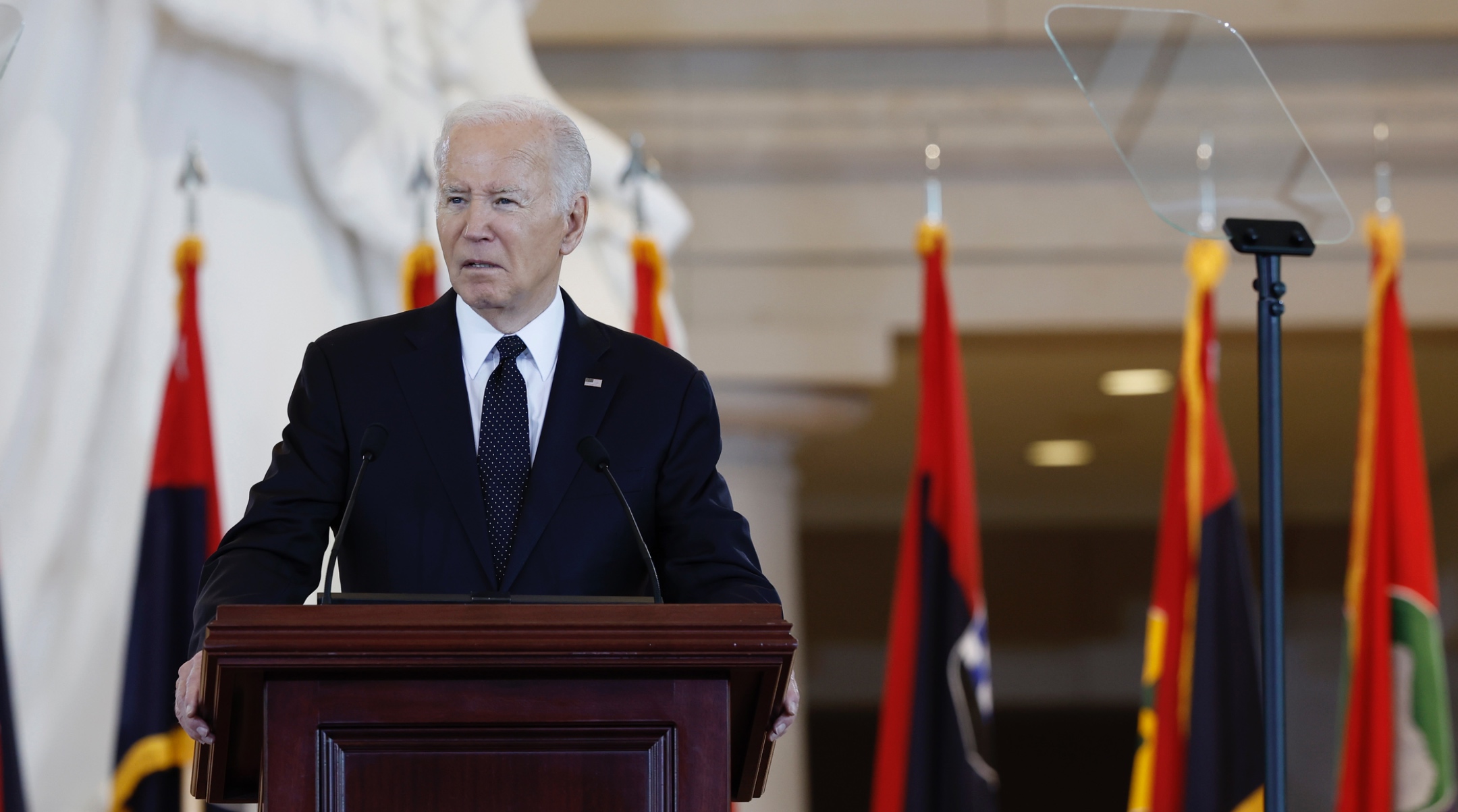Biden announces Israeli plan that would end war in Gaza, and urges Hamas to accept
Biden expressed concern that pressure from Israeli right-wingers could still scupper the deal

U.S. President Joe Biden speaks during the U.S. Holocaust Memorial Museum’s Annual Days of Remembrance ceremony at the U.S. Capitol, May 7, 2024. (Anna Moneymaker/Getty Images)
WASHINGTON — President Joe Biden announced what he described as an Israeli plan to end the war with Hamas and urged the terror group to take it up, although he expressed concern that pressure from right-wing leaders in Israel’s government could still scupper the deal.
The deal, Biden said Friday in an address from the White House, would culminate in the release of all the hostages held in Gaza and the withdrawal of Israeli forces, and would incapacitate Hamas so it would not be able to carry out another mass attack like its Oct. 7 invasion of Israel that killed some 1,200 people and launched the war.
He said the proposal came from Israel and that it was now up to Hamas to take the deal. By contrast, most international pressure to end the war has placed the onus on Israel to halt its fighting in Gaza. Israel is increasingly isolated as the country faces genocide charges in the International Court of Justice, and the International Criminal Court prosecutor is seeking the arrest of Israeli Prime Minister Benjamin Netanyahu and Defense Minister Yoav Gallant.
“Israel has offered a comprehensive proposal,” Biden said. “Now it’s time to raise your voices and demand that Hamas come to the table,” he said, addressing protesters and foreign leaders who have pressed for a ceasefire.
There was not yet any confirmation from Netanyahu’s government of the deal. Israel’s national security adviser, Tzachi Hanegbi, reportedly told relatives of hostages that Israel would not agree to a deal to end the war in exchange for the hostages’ release. Earlier this week, he predicted that the war would last until the end of the year.
The deal Biden described would start with a six-week ceasefire and the release of women, wounded and elderly hostages, as well as a withdrawal of Israeli forces from population centers, and the acceleration of the entry of humanitarian assistance into Gaza, where the humanitarian crisis is believed to be cascading into a state of famine. Israel would release hundreds of Palestinian prisoners in exchange.
The second phase of the deal would see the release of Israeli troops held by Hamas, and the final phase would release the bodies of hostages who were killed by Hamas or who died in captivity and the full withdrawal of Israeli forces. According to the Hamas-run Gaza health ministry, more than 36,000 people have been killed in Gaza. Israel says more than a third of that number are combatants, and has itself lost close to 300 soldiers in the war.
Biden said Hamas would be incapacitated to the extent that it could not carry out another Oct. 7-style attack. Israel’s aim in the war until now was the freeing of hostages and the destruction of Hamas. Biden, who did not take questions, did not say whether Hamas would have any role in the reconstruction he envisioned after the war.
“The people of Israel should know they can make this offer without any further risk to your own security because they’ve devastated Hamas forces over the past eight months,” he said. “At this point. Hamas no longer is capable of carrying out another October 7, [which] is one of Israel’s main objectives of this war and quite frankly a righteous one.”
Biden appeared to anticipate resistance from Israel’s right wing, including from far-right ministers in Netanyahu’s cabinet.
“I know there are those in Israel who will not agree with this plan will call for the war to continue indefinitely,” Biden said. “Some are even in the government coalition, and they have made it clear they want to occupy Gaza. They want to keep fighting for years, and hostages are not a priority. Well, I’ve urged the leadership in Israel to stand behind this deal.”
Biden held out the prospect of a comprehensive Middle East peace deal that would include normalization of ties with Saudi Arabia, long a key goal for Netanyahu.
This article originally appeared on JTA.org.
A message from our CEO & publisher Rachel Fishman Feddersen
I hope you appreciated this article. Before you go, I’d like to ask you to please support the Forward’s award-winning, nonprofit journalism during this critical time.
We’ve set a goal to raise $260,000 by December 31. That’s an ambitious goal, but one that will give us the resources we need to invest in the high quality news, opinion, analysis and cultural coverage that isn’t available anywhere else.
If you feel inspired to make an impact, now is the time to give something back. Join us as a member at your most generous level.
— Rachel Fishman Feddersen, Publisher and CEO